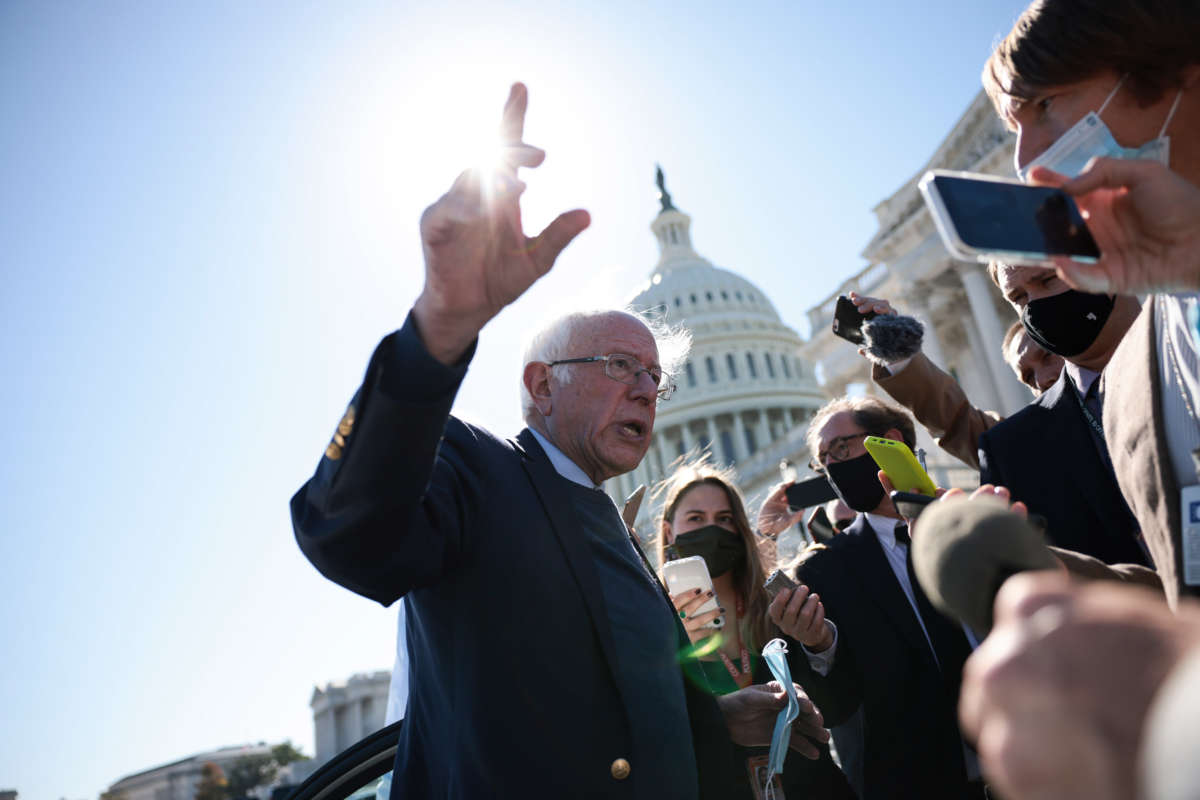On Thursday morning, the White House released a new framework for the Democrats’ reconciliation bill, investing a mere $1.75 trillion into social and climate programs over 10 years and cutting key proposals like paid medical and family leave. At $175 billion a year, the bill would cost only about one-fifth of the amount that the Senate has appropriated for the defense budget for next year — even though the original reconciliation draft was entirely paid for.
The cuts made to the bill are drastic, slashing the $3.5 trillion price tag in half. Overwhelmingly popular proposals like free community college, paid leave and tax hikes on corporations and the wealthy are now excluded from the bill, and provisions to allow Medicare to negotiate prescription drug prices and cover dental and vision are also gone. The Clean Energy Payment Program, which was formerly central to the climate plank of the bill, has been nixed along with electric vehicle funding.
President Joe Biden is holding meetings with Congress on Thursday in attempts to convince the Democratic caucus to support the new draft. Official draft text of the bill has yet to be written, and provisions could still be added or subtracted as negotiations continue to drag on. But after months of negotiations, the prognosis appears bleak for progressives and members of the public who supported the bill as it was originally proposed.
Sen. Bernie Sanders (I-Vermont) has emphasized to reporters that the bill isn’t just a race between politicos in Congress; it’s about protecting the public against huge corporations and special interests that have spent at least tens of millions lobbying against proposals that will improve Americans’ lives.
“The challenge that we face in this really unusual moment in American history is whether we have the courage to stand with the American people and take on very powerful special interests,” Sanders told reporters on Wednesday. “If we fail — in my view, if the American people do not believe that government can work for them and is dominated by powerful special interests, the very fabric of American democracy is in danger,” he continued. “People will no longer believe — have faith that their government represents them. That’s what this issue is about.”
Most of the cuts to the bill have been made at the behest of two conservative Democrats in the Senate with incredibly close ties to lobbyists who have become household names due to their continued obstruction: Senators Kyrsten Sinema (D-Arizona) and Joe Manchin (D-West Virginia).
A frustrated Sanders slammed Manchin and Sinema late on Wednesday for gutting the bill that he crafted earlier this year, saying that they have “sabotaged” and “destroyed” the bill.
Manchin in particular has been on a warpath this week, cutting electric vehicle credits and a billionaire tax that would have affected only the wealthiest 0.0002 percent of Americans from the bill, for reasons that essentially amount to complete frivolity.
“They talked about electric vehicles spending, $80 million building charging stations,” Manchin said recently, proceeding to make a wildly false equivalence. “I said I’m having a hard time with that. I don’t remember the federal government building filling stations when Henry Ford invented the Model T.” Of course, the Model T was invented in 1908, when there were only about two cars per thousand people and when people were ignorant of the now-rapidly worsening climate crisis that the electric vehicle provision aims to address.
Earlier this year, Manchin said in a secret memo that he wanted a bill that was only $1.5 trillion. If cutting the bill has been the lawmaker’s goal this whole time, then he has largely succeeded: Progressives had originally proposed $6 trillion, or even $10 trillion for a social and climate spending bill. While they have to compromise by trillions, Manchin only has to give up an extra $25 billion a year.
Sinema, on the other hand, has been purposefully opaque about her demands. Perhaps most absurdly, she has demanded that the dismally low tax rates for corporations and the wealthy stay at their current, Republican-supported levels. She has also succeeded in getting the plan to allow Medicare to negotiate prescription drug prices removed from the bill entirely — despite the fact that the proposal had a whopping 88 percent approval rate from the public.
To be sure, there are still some provisions left in the bill that could make a dent on climate and slightly expand the social safety net. The White House claims that the $555 billion set aside for climate provisions like clean energy credits will help reduce emissions by 50 to 52 percent of 2005 levels by 2030, but climate experts are skeptical that the climate provisions will work without enforcement mechanisms.
The bill still includes universal pre-kindergarten and child care funding, though child care funding is no longer universal as it was in previous drafts. The bill extends the expanded child tax credit for one year, even after it was threatened to be cut entirely or severely means tested, thanks to Manchin. However, the original framework would have funded the expanded child tax credit for another 10 years.
Concerningly, the bill will likely still include fossil fuel subsidies — over a hundred billions’ worth, if so-called deficit hawk Manchin has his way. The coal baron has also included funds for the coal industry in the bill. As chair of the Committee on Energy and Natural Resources, Manchin is in charge of crafting the energy provisions of the bill, despite his cozy relationship with Exxon lobbyists — meaning that funding for the coal industry may well make it into the final draft.
